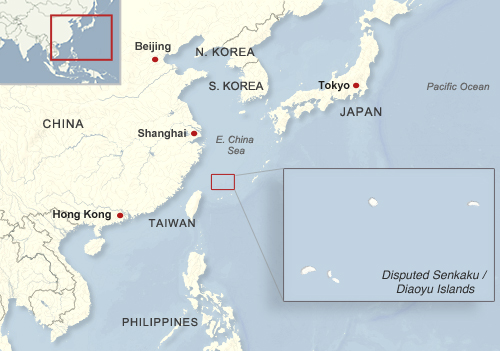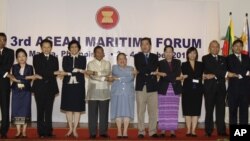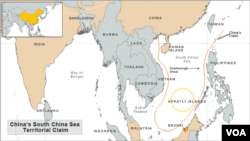MANILA —
Delegates with the 10 Association of Southeast Asian Nations, a handful of East Asian countries and other Western powers skirted controversy over the heated issue of conflicting claims in Asia-Pacific waters during a meeting this week in the Philippines.
Diplomats joined security experts, maritime officials and others to discuss regional cooperation, the protection of marine resources and trade routes at a time when there has been growing tension over territorial disputes throughout the region.
In the past year, claims in the South China Sea have come to the fore with Vietnam and the Philippines leading the push with complaints against China. And more recently, the flare-up between China and Japan over tiny outcroppings in the East China Sea has continued.
When Japan’s deputy foreign minister addressed the forum in Manila, Tsuruoka Koji made the case for creating more specific rules to deal with disputes in international waters -- apart from the United Nations Convention on the Law of the Sea (UNCLOS).
“More effort should be made to establish maritime order and rules depending on characteristics of each region in accordance with relevant international laws including UNCLOS," Tsuruoka said. "Of course, these efforts must be made through peaceful talks. We should firmly deny any idea justifying ‘might is right.’”

The dispute in the East China Sea started when Japan bought what it calls the Senkaku Islands from a private Japanese owner. China, which calls the islands Diaoyu has claimed the islands as its own. The rocks are surrounded by waters abundant in fish and potentially rich mineral deposits. The dispute has brought violent protests in China and stirred up historical resentments.
Sam Bateman, an analyst with the Australian National Center for Ocean Resources & Security, says the dispute in the East China Sea is now the main worry in the region.
"The situation over the Senkaku/Diaoyu islands is potentially more serious, because you've got bilateral, you've got two big countries, sort of sabre-rattling at each other," Bateman explained. "I think the situation in South China Sea, given the relationship between China and ASEAN, economic relations, etcetera, I don't see it breaking out into the sort of conflict which you fear."
The disputes in the South China Sea surround mainly the Spratly Islands, which are being claimed in part or entirely by China, Vietnam, the Philippines, Taiwan, Malaysia and Brunei. These waters straddle some of the world’s most heavily traveled sea lanes. They are also rich in fishing and hold potentially vast oil and gas reserves.
In these disputes, China has preferred to deal with each claimant one on one. But some of the claimants including the Philippines have pushed for multilateral talks and turning to UNCLOS to settle its disputes.
Delegates from Japan, China, South Korea, India, the U.S., Australia, New Zealand and Russia attended the meeting. Apart from the Japan-China dispute, South Korea is in an island dispute with Japan.
Vietnam Deputy Foreign Minister Pham Quang Vinh said all participants have acknowledged the territorial disputes.
“And we stressed together the need for ensuring an environment of peace, stability and maritime security, including; the parties need to abide by international law and UNCLOS and show restraint so as not to allow the territorial disputes to become conflicts,” he said.
Vinh said the general feeling of the session was the need to find areas for cooperation and address “challenges” which include the disputes.
The U.S. delegate to the meeting told reporters the group had in-depth discussions on freedom of navigation, lawful commerce and lawful exploitation of resources.
Japan proposed the regional discussion last year, long before its territorial dispute with China erupted.
Diplomats joined security experts, maritime officials and others to discuss regional cooperation, the protection of marine resources and trade routes at a time when there has been growing tension over territorial disputes throughout the region.
In the past year, claims in the South China Sea have come to the fore with Vietnam and the Philippines leading the push with complaints against China. And more recently, the flare-up between China and Japan over tiny outcroppings in the East China Sea has continued.
When Japan’s deputy foreign minister addressed the forum in Manila, Tsuruoka Koji made the case for creating more specific rules to deal with disputes in international waters -- apart from the United Nations Convention on the Law of the Sea (UNCLOS).
“More effort should be made to establish maritime order and rules depending on characteristics of each region in accordance with relevant international laws including UNCLOS," Tsuruoka said. "Of course, these efforts must be made through peaceful talks. We should firmly deny any idea justifying ‘might is right.’”

The dispute in the East China Sea started when Japan bought what it calls the Senkaku Islands from a private Japanese owner. China, which calls the islands Diaoyu has claimed the islands as its own. The rocks are surrounded by waters abundant in fish and potentially rich mineral deposits. The dispute has brought violent protests in China and stirred up historical resentments.
Sam Bateman, an analyst with the Australian National Center for Ocean Resources & Security, says the dispute in the East China Sea is now the main worry in the region.
"The situation over the Senkaku/Diaoyu islands is potentially more serious, because you've got bilateral, you've got two big countries, sort of sabre-rattling at each other," Bateman explained. "I think the situation in South China Sea, given the relationship between China and ASEAN, economic relations, etcetera, I don't see it breaking out into the sort of conflict which you fear."
The disputes in the South China Sea surround mainly the Spratly Islands, which are being claimed in part or entirely by China, Vietnam, the Philippines, Taiwan, Malaysia and Brunei. These waters straddle some of the world’s most heavily traveled sea lanes. They are also rich in fishing and hold potentially vast oil and gas reserves.
In these disputes, China has preferred to deal with each claimant one on one. But some of the claimants including the Philippines have pushed for multilateral talks and turning to UNCLOS to settle its disputes.
Delegates from Japan, China, South Korea, India, the U.S., Australia, New Zealand and Russia attended the meeting. Apart from the Japan-China dispute, South Korea is in an island dispute with Japan.
Vietnam Deputy Foreign Minister Pham Quang Vinh said all participants have acknowledged the territorial disputes.
“And we stressed together the need for ensuring an environment of peace, stability and maritime security, including; the parties need to abide by international law and UNCLOS and show restraint so as not to allow the territorial disputes to become conflicts,” he said.
Vinh said the general feeling of the session was the need to find areas for cooperation and address “challenges” which include the disputes.
The U.S. delegate to the meeting told reporters the group had in-depth discussions on freedom of navigation, lawful commerce and lawful exploitation of resources.
Japan proposed the regional discussion last year, long before its territorial dispute with China erupted.





